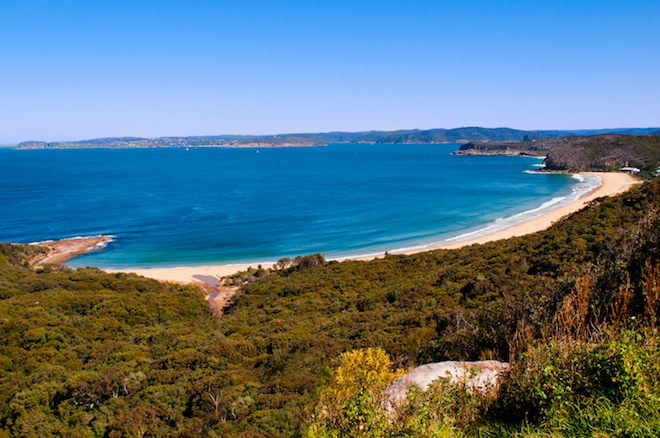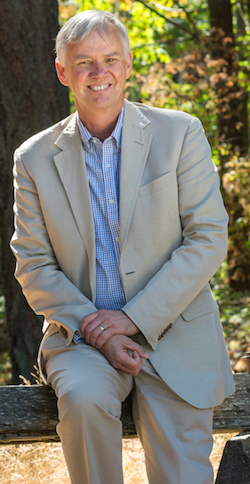Law of the tribe
 Tuesday, November 6, 2018
Tuesday, November 6, 2018 Former USyd law dean champions Indigenous law degree in Canada ... Juris indigenarum doctor ... Building trust over time ... Australian law schools yet to embrace the opportunity ... Asking tough questions about Indigenous legal orders ... Corporate support ... Nick Bonyhady talks with Jeremy Webber
 Killcare: where Canadian Indigenous law degree was hatched
Killcare: where Canadian Indigenous law degree was hatched
Killcare Beach on the Central Coast of NSW is a long way from the University of Victoria in British Columbia.
In 2004, John Borrows and Jeremy Webber from the UVic Law School were at Killcare when Borrows raised the idea of a joint degree in indigenous and Canadian law.
Now 14 years after conception, 25 students a year will study units like Canadian common law in intense comparison with a particular Canadian indigenous tradition. Webber told Justinian:
"My colleague Val Napoleon is teaching property law. She's teaching it in comparison with Gitksan law, a people just inland from the coast of Northern British Columbia. Another colleague, David Milward is Cree from Saskatchewan, he's teaching criminal law, dealing with the way in which disruptive and antisocial conduct is dealt with in Cree law."
The students, who will spend one year longer at UVic than their counterparts in the pure common law stream, will emerge both with a juris doctor and a juris indigenarum doctor.
It will be taught in English, but incorporate a unit on the language and law of the Coast Salish peoples - giving students an understanding of how the two inform each other.
It is fundamentally different to the approach taken by Australian universities, including the University of Sydney where Webber was dean from 1998 to 2002.
At an undergraduate level, Sydney University has one unit explicitly focussed on indigenous people and the law. That unit focusses primarily on how indigenous people interact with whitefella law - not on indigenous legal orders.
Webber explains that in Canada too, law schools have typically provided the "merest introduction to the fact that there are indigenous legal traditions".
 Webber: tools to interpret and develop indigenous law For Indigenous students Webber says that in many ways, it has been "an education in displacement" because students don't gain any skills in navigating their own legal traditions.
Webber: tools to interpret and develop indigenous law For Indigenous students Webber says that in many ways, it has been "an education in displacement" because students don't gain any skills in navigating their own legal traditions.
This has consequences. He says:
"Certainly non-indigenous law doesn't have much currency in indigenous contexts ... or at least it's very much seen as being imposed externally. And frankly it doesn't do good work as law in many contexts."
Though there are important and notable exceptions, he says that when indigenous groups go to Canadian lawyers for help with governance documents ...
"... frankly what they get from us is not all that different from a model that has been developed in a non-indigenous context, striking out the name of regional municipality and writing in the name of the indigenous community."
The same is often true here.
But the purpose of the new degree is not to uncritically reify indigenous legal traditions.
Webber emphasises that a background of trust has allowed scholars and students at UVic to ask tough questions of Indigenous legal orders, including questions of gender relations and sexual orientation.
It is important that such questions be asked because the university sees the degree as equipping students with tools to interpret and further develop indigenous law.
"They're ... traditions that live in people attempting to interpret them, attempting to apply them, attempting to figure out how to have a child welfare system that works in communities."
The trust that has allowed the University of Victoria to launch this degree has been long earned.
For over 20 years, about a third of UVic first year law students have spent several days in indigenous communities.
Webber says it's often their "first experience speaking to an indigenous person, let alone living in a community".
The law school also has a significant indigenous research unit, a large indigenous alumni base and student body - about nine percent of the current general law cohort.
It will hire more indigenous academics to teach the program and pay indigenous community educators for the time they spend with UVic students when they travel to communities as part of their studies for the new degree.
Two of Webber's respected Indigenous colleagues in the law faculty, Borrows and Van Napoleon, were central to the conception and development of the curriculum. Webber says: "It would have been utterly unattainable without them."
Australian law schools are a long way from launching a program such as this, but the Canadian experience shows the value of building a good faith relationship over time.
Contrary to what one might expect here, Webber says the project did not become politicised.
"It was quite common that the people who worked in industry with the indigenous people themselves saw the value of this."
He adds:
"As the question of support ... climbed up the ladder, I sometimes wondered whether scepticism also seemed to build."
Webber suspects that the project's "transformative aspiration was worrying to some actors who when it came right down to it were quite comfortable ... with the relationship" as it stood.
Nonetheless, the program ultimately achieved a broad base of support. It is being funded through large private donations from an array of foundations - some tied to major companies - and deep public support from the province of British Columbia.
For large scale funding of indigenous education to be a fairly uncontroversial public good is itself a major step.









Reader Comments